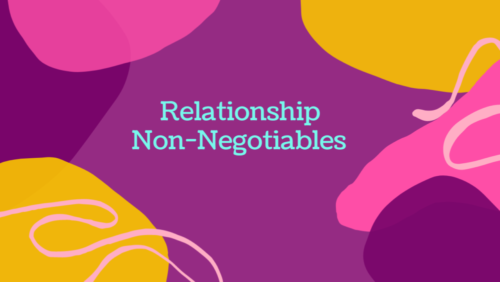We are constantly told that in order to have a healthy relationship, you must be willing to compromise. That is something I strongly believe in. However, with the significance of compromise comes the importance of non-negotiables in a relationship. These are the most essential factors for you. Things you don’t want to give up. These are, in a sense, your deal-breakers. We’ve all got them. There is nothing wrong with that at all.
Why Do Non-negotiables Exist in a Relationship?
When you ignore your non-negotiables for the sake of comfort or to avoid disputes or a breakup in a relationship, you are setting yourself up for failure. You are causing conflict and animosity. It is better for relationships and your own well-being to stick to what is important to you.
Ignoring even one non-negotiable can result in a significant problem later on. We frequently believe that we can get over or move on from something for the sake of the relationship. That is not the case when it comes to a non-negotiable. Non-negotiables will always come back to harm a relationship.
You’ll be happier and won’t waste time with someone who doesn’t desire what you do if you keep them in the forefront of your thoughts from the start.
Importance of Non-negotiables in a Relationship
As previously said, a lack of non-negotiables, or at least a failure to prioritize them, can strain your relationship. Every one of us has non-negotiables. Whether you never want to leave your family or don’t want to have children, there are some things we can’t change.
Continuing a relationship in the hope that the other person will compromise on these non-negotiables is unjust to your partner and yourself. It also adds extra strain to your relationship.
If you want your relationship to work, express your non-negotiables.
What Are Non-negotiables in a Relationship?
Now that you understand why establishing and articulating your non-negotiables is critical, examine what they are.
Non-negotiables are not stuff like “I want a house with a porch and will accept nothing less.” Or I want a man who dresses up every day. These are things to look for, but they are not deal-breakers.
Not sharing the same religious views or political objectives could be a non-negotiable. It could be that you have a partner who is unable to show your love in the ways that you require. Or maybe you spend a lot of time with your family, but your partner isn’t on board.
These are items you require in your life or your basic values. Travel places and home décor selections are both negotiable. Things that define you should not be bargained over.
Sure, some couples enjoy mixing their opinions or attitudes, but you shouldn’t have to if that isn’t something you can compromise on.
What Are Some Examples of Non-negotiables in a Relationship?
It can be tough to identify your non-negotiables until a difficult situation comes. You may believe you would do anything for your lover, but some things are too essential for you to compromise. And that’s fine.
Many people advise you to prioritize your relationship. What you truly need to do is prioritize yourself. You cannot be happy in a relationship if you are unhappy with yourself, your choices, and your life. It is critical to remind yourself that your aspirations, needs, and happiness depend not on your relationship but the other way around.
So, what are your absolute non-negotiables? Here are some of the most typical challenges that couples face. Their non-negotiable quality may force you to make a difficult choice.
#1. Commitment
It’s not fair to ask for a commitment in the early stages of a relationship, but it’s crucial to know that you both are prepared to put in the effort to make your relationship succeed.
#2. Affection
Affection encompasses both physical and emotional affection, and both are equally crucial in a relationship. It’s the simple things that count; holding hands and unexpected compliments add up.
#3. Inventiveness
When you’ve had a bad day at work and an even worse commute, you’re probably not in the mood to talk to your partner. However, it is critical to communicate your feelings to your partner in both good and bad times.
#4. Sincerity
Being truthful in a relationship helps foster trust between partners, which is essential in developing a strong relationship.
#5. Lucidity
It’s usually not a good idea to start a relationship if one person wants a ‘friends with benefits’ relationship while the other desires a committed relationship. Both parties should be clear about where they want their relationship to go.
#6. Priorities
Priorities are vital in life, and if your relationship is not one of them, it could cause problems for both of you later on.
#7. Adaptability
We recognize that not everyone enjoys trying new things, but in a relationship, it is critical to keep your mind open to the concept of experimenting. Seeking out new experiences will keep the fire burning in your relationship.
#8. Compassion
Empathy is vital in a good relationship since it helps to strengthen the bond between the two of you.
#9. Respect
Your partner and you should respect each other not only in the relationship but also in each other’s beliefs.
#10. Have faith
Finally, one must be understanding and trustworthy of their relationship. Jealousy is a natural human emotion; thus, it is reasonable at times. But only on rare occasions! You must learn to put your trust in your partner.
#11. You Feel Comfortable Sharing Your Dreams
Your partner should encourage and support your dreams and goals.
They should not dismiss your ideas by telling you that you can’t accomplish it, that it’s too huge, or that the time isn’t right.
A decent romantic partner should be your biggest fan. When you are feeling disheartened, they should encourage you to keep going. When you fall, they should assist you in getting back up. They should be ecstatic about your success.
Your partner should have faith in you and want you to grow and improve in life.
#12. You Respect each other’s Space.
Of course, when you’re in a great relationship, you want to spend time with that person, but having your own stuff is also necessary.
Being clinging or prohibiting you from socializing with others is unhealthy.
In a good relationship, both parties can spend time apart without feeling neglected or envious. They are allowed to be autonomous for a period of time before reuniting for quality time.
This also implies that if one of you says, “I need space,” the other person respects that request and does not take it personally.
#13. They Have a Sense of Purpose
Being goal-oriented is an important characteristic to search for in a love partner.
Goals are an indication of ambition. They demonstrate that the individual is attempting to advance and improve their life. It demonstrates that they aren’t content to stay in their comfort zone; they want to extend and challenge themselves.
Trying to enhance your own life while having a partner with no objectives is like trying to travel down the wrong escalator. They’ll continue to drag you down to their level.
#14. They Discuss Exes with Dignity
Obviously, not every relationship ends pleasantly; your partner does not have to laud or like their ex, but be wary of persons who solely denigrate their previous relationships and blame everything on the other person.
In a relationship, no one is flawless; everyone brings something positive and something negative to the table. However, if the person you’re dating only talks about their ex-partners in excessively derogatory ways, this is a significant red flag.
You’ll eventually become one of their ‘crazy exes,’ whom they tell the next person about.
A mature individual gains knowledge from previous relationships. They were not victims but active participants, and they must accept responsibility for that.
#15. Similar cleanliness levels.
I’m not a neat freak by any means, but I wash the dishes within the day and prefer things to be moderately organized at all times. If you’re a neat freak, hang out with other neat freaks. Find another pig to root about with if you’re a bit of a pig. But, in any case, never be with someone who is several leagues above your degree of hygiene.
Open and honest about what they want out of a relationship. Perhaps some people are content to float in the ether of what are we for months or even years at a time. But, for me and, I imagine, many other individuals like me, knowing what everyone’s long-term objectives are ahead of time is a major aspect of starting a relationship. Because once you’ve caught those feelings, they can’t be undone.
#16. A solid moral compass
Some people are influenced by their religious ideas and are unwilling to date persons who do not share their values. Others find their moral compass in philosophy, science, or simple observation of their surroundings. A strong moral compass is vital for a healthy relationship regardless of background or views. Those with dubious morality and situational ethics are untrustworthy and difficult to trust. It is also critical that your personal principles and ideals are compatible. You do not have to believe the same things, but you must agree on the fundamentals of how you will spend your life and raise your children.
#17. You respect each other’s families.
This one is quite important. Everyone loves and prioritizes their family. Respecting your partner means respecting their parents and other family members. Ignoring your in-laws can be an instant turn-off for your partner and leave them angry for a long time.
Respect is undeniably important in dating and marriage.
What Are Your Non-negotiables?
Non-negotiables are the things you will not compromise on. They are guided by your beliefs and ideals and determine not just what you will and will not accept from others but also what you will and will not accept from yourself.
What Do You Consider the Most Important Answers to Non-negotiables?
Respect, Belief, Loyalty, Commitment, Trust, Courage, and Gratitude are the seven Non-Negotiables. Ideal candidates possess traditional and job-specific competencies, as well as strong proficiency in these seven basic attributes.
What Does Negotiable Mean in a Relationship?
Negotiation is a strategic dialogue that resolves an issue in a way that both parties find acceptable. In a negotiation, each participant attempts to persuade the other to agree with his or her point of view. By bargaining, the parties concerned aim to avoid arguing while agreeing on some type of compromise.



